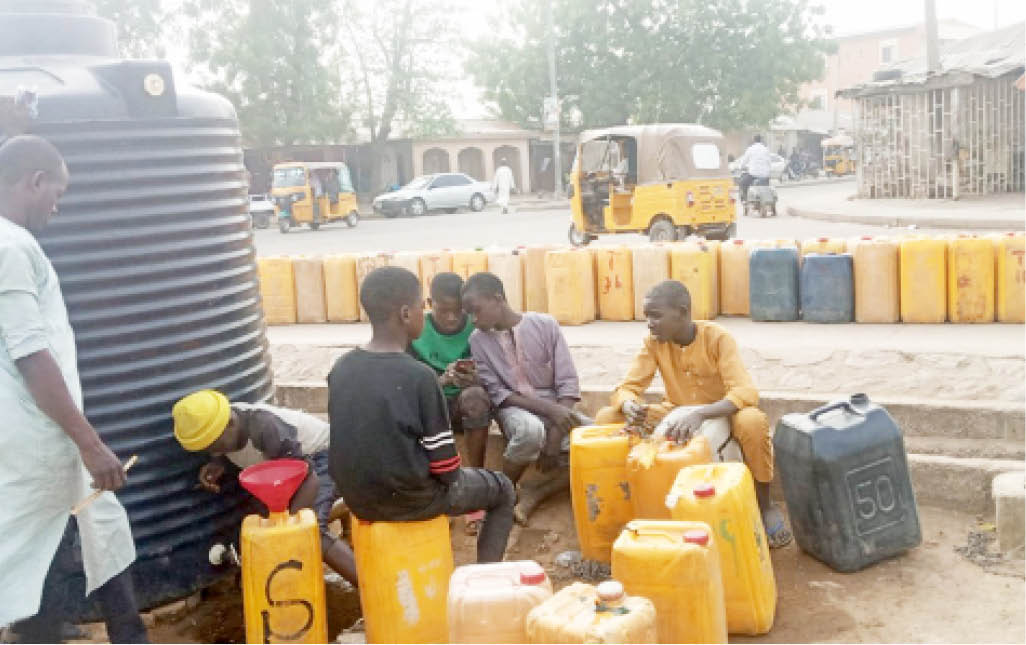Keep your promises: End water poverty
By Dumebi Oduah What does water mean to you? This was the question asked on March 22nd as the world celebrated World Water Day. The International water day aimed to draw attention to the global water situation, the need for effective water management as global water systems/aquifers continue to shrink and the stress faced by […]

FILE PHOTO: Some residents of Tansha Babiye fetching water from a water reservoir in Bauchi
By Dumebi Oduah
What does water mean to you? This was the question asked on March 22nd as the world celebrated World Water Day. The International water day aimed to draw attention to the global water situation, the need for effective water management as global water systems/aquifers continue to shrink and the stress faced by marginalised communities who lack access to water.
- Striking doctors to National Assembly: Ban govt officials from medical tourism
- 4 Winners get Jaiz bank’s N125m COVID-19 fund
It is a great step that the day was celebrated in Nigeria to create awareness on the lack of clean water in rural communities, but it should not stop at picture posting or story-telling, something must be done about the issue. Creating awareness alone on the lack of access to clean water in rural communities once a year isn’t enough to drive the sustainable change that will bring about the realisation of SDG 6 in Nigeria. Stronger and intentional political action is needed to bridge the widening gap between the entire population and the number that have access to clean water. Without actions being taken of what use is the knowledge. According to J.W. Von Goethe, “knowing is not enough, we must apply. Willing is not enough, we must do”. And no truer words have been spoken, the knowledge is simply not enough it must be applied.
The importance of water in our lives cannot be overemphasised. Water is life, it is more than just a basic need it is a fundamental human right. We need water just as much as we need the air we breathe. The sacrosanct nature of water is heightened when issues bordering around hygiene and sanitation are put in perspective.
It’s really a thing of concern how persons in marginalised communities survive with little access to clean water. Their daily struggle to access water which in many cases is unclean and contaminated predisposes them to a lot of dangers and hazards. For many women and girls; they are exposed to sexual and gender-based violence, their menstrual hygiene is threatened and productive time is lost. For school children; they lose productive school time simply because they have to go in search of water. In general, many rural communities are vulnerable to disease outbreak that are water related such as cholera and these also contribute to money lost to emergency aid provided by government thereby impacting the GDP of the nation.
In Nigeria, poor access to clean water and sanitation has been a developmental issue plaguing numerous communities around the country. Lack of access to clean water seemed more or less a rural area problem but slowly this problem has started creeping its way into some peri-urban and urban areas. According to UNICEF, “seventy-three percent of the diarrheal disease burden is associated with poor access to adequate water, sanitation and hygiene (WASH), and children from poorer homes are largely affected by this”. These WASH related illnesses sometimes lead to poor performance in school and even malnutrition in children. Some other studies show that poor access to water and sanitation leads to open defecation. It is quite evident that poor access to water has a domino effect in our society. Issues pertaining to water can never be isolated, because in its absence it creates more problems and hinders our progress.
Nuhu Joseph a community leader in Rije community of Kuje Area Council, spoke with HipCity Innovation Centre (HipCity Hub) on the lack of clean water in his community. He said, to them water is more of a luxury than a necessity, most of the boreholes in his community are either nonfunctional or inadequate to cater for the residents of the community. They have resorted to getting their water from a stream close by as they lack the funds to repair the damaged boreholes and help from the government is not forthcoming. The source of water Joseph spoke of was clearly unfit for drinking and other domestic uses, but this is reality for the residents of Rije community and several other suburbs in the Federal Capital Territory.
The UN Water Global Analysis and Assessment of Sanitation and Drinking Water put the figure of Nigerians who do not have access to safe drinking water at 67 million while 42 per cent of households do not have access to clean water. This number is alarming and bodes ill for the public health and safety of citizens.
It is the duty of the State through its appendage Water Boards and the Rural Water Supply and Sanitation (RUWASSA) to provide safe and clean drinking water for all citizens. For efficiency and greater output, they are expected to work with local governments in their various states to ensure each local community is adequately catered for. There is an obvious need for the government to re-strategise and double their efforts in ensuring the provision of clean and safe water for all Nigerians.
With proper monitoring and evaluation; progress can easily be tracked and areas that are still lacking or in need of maintenance can effectively be given the attention they require. It is not enough to just create awareness on water challenges, the government must keep their promises and be held accountable because they owe the people this duty.
Joining the global commemoration of March 22 shouldn’t just end at government making political statement it must be matched with strong political will and commitment to rescue over 60 million Nigerians facing water poverty.
Oduah wrote from HipCity Innovation Centre, Abuja.
